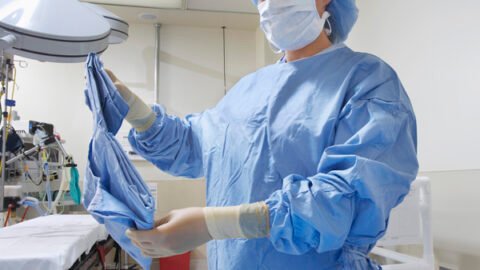How to Make $300,000 a Year as a Nurse: Side Hustle Strategies for CRNA’s
Achieving a $300,000 annual income as a nurse may seem like a distant dream, but with strategic planning and the right side hustles, it’s a goal within reach. Certified Registered Nurse Anesthetists (CRNAs) are among the highest-paid nursing professionals, and their expertise generates significant value in the healthcare industry. Nurses who aim to boost their earning potential can explore CRNA roles and various side hustles tailored to their unique skill sets and credentials.
In today’s gig economy, nurses have the flexibility to pursue side hustles that complement their main job, leveraging their medical knowledge and skills to increase their income. From medical transcription to consulting, teaching, or freelance writing, there’s a plethora of opportunities for nurses to capitalize on. This can not only help pay down student loans more quickly but also pave the way for financial freedom and professional growth.
For those who are willing to commit to additional certifications, higher education, or geographic relocation, the financial rewards can be compelling. Working in a high-paying state or at a well-compensated facility often results in a substantial salary uplift. Combining a CRNA role with entrepreneurial ventures or per diem work can cumulatively push a nurse’s income to the sought-after $300,000 mark.
Understanding the Role of a CRNA

Certified Registered Nurse Anesthetists (CRNAs) are highly trained advanced practice nurses who specialize in anesthesia care, one of the most lucrative nursing specialties. They play a crucial role in healthcare teams, delivering anesthesia to patients in a variety of settings and holding responsibility for their safety and well-being during procedures.
Educational Requirements
To become a CRNA, individuals must first obtain a Bachelor of Science in Nursing (BSN) and then acquire licensure as a Registered Nurse (RN). Following their undergraduate studies, they are required to gain experience in critical care settings. The next step is to complete a graduate-level nurse anesthesia program, which typically culminates in a Doctor of Nursing Practice (DNP) or a Doctor of Nurse Anesthesia Practice (DNAP).
- Undergraduate: Obtain a BSN
- Licensure: Become a licensed RN
- Experience: Accumulate critical care experience
- Graduate Education: Enroll in and complete a DNP or DNAP program
Certification and Licensing
After completing the graduate program, nurses must pass the National Certification Examination administered by the National Board of Certification and Recertification for Nurse Anesthetists (NBCRNA). Successful passage of this exam grants the CRNA credential. CRNAs must maintain their certification through continued education and periodic recertification.
- Examination: Pass the National Certification Examination
- Certification: Obtain CRNA credential from NBCRNA
- Maintenance: Fulfill continued education and recertification requirements
Scope of Practice
CRNAs are authorized to administer anesthesia independently in all 50 states, with their scope of practice including pre-anesthetic preparation and evaluation, anesthesia induction, maintenance and emergence, post-anesthesia care, and pain management services. They work in a variety of settings such as hospitals, outpatient surgery centers, and dental offices. CRNAs must be adept at using complex medical equipment and possess the ability to make quick, informed decisions regarding patient care.
- Preparation: Evaluate patients pre-anesthesia
- Anesthesia: Perform induction, maintenance, and emergence
- Post-Anesthesia Care: Manage patient recovery from anesthesia
- Pain Management: Provide pain control services
Exploring Side Hustles for CRNAs

Certified Registered Nurse Anesthetists (CRNAs) possess a unique set of skills that can be leveraged in various side hustles to potentially increase their earning capacity. Below are critical factors for CRNAs to consider when expanding their income through secondary employment opportunities.
Legal Considerations
Before a CRNA begins any side hustle, it is imperative to understand the legal implications. They must ensure that their secondary employment complies with:
- State Regulations: Each state has specific laws governing nursing practices, including contract work outside of primary employment.
- Contractual Agreements: CRNAs should review their current employment contracts to avoid conflicts of interest and adhere to non-compete clauses.
- Liability Coverage: Additional professional liability insurance might be required to cover the scope of the side job.
Balancing Primary and Side Jobs
Time Management: A well-organized schedule is crucial to manage a full-time job and a side hustle without risking burnout. CRNAs should consider side jobs that offer flexible hours or those that can be performed during their off-days.
Professional Boundaries: It is important for CRNAs to establish clear professional boundaries to separate their main job responsibilities from their side hustle activities, ensuring that each role receives the appropriate focus and energy.
Freelancing in Anesthesia
Freelancing in anesthesiology opens a new revenue stream for nurses trained in this field. Certified Registered Nurse Anesthetists (CRNAs) can leverage their expertise beyond traditional roles by providing consulting services and guest speaking engagements.
Consulting Services
CRNAs can offer consulting services to various healthcare facilities seeking temporary or part-time expertise in anesthesia. Offering insights on best practices, developing protocols, or optimizing surgery room workflows can be lucrative. They may consult for institutions looking to improve patient outcomes or for companies developing new anesthesia-related products.
Guest Speaking Engagements
Engaging in guest speaking engagements is another avenue for CRNAs to generate income. They can present at conferences, lead workshops, or provide education sessions for both medical professionals and students. This not only bolsters the CRNA’s reputation but also provides networking opportunities that could lead to further lucrative engagements.
Leveraging Online Platforms

Nurses can significantly boost their income by tapping into online platforms, where telemedicine and educational content creation offer viable paths to earning high revenue.
Telemedicine Opportunities
Telemedicine has opened a new frontier for nurses, allowing them to consult and provide care remotely. With the rise of telehealth services, Nurse Practitioners (NPs) and Certified Registered Nurse Anesthetists (CRNAs) can often command higher fees for virtual consultations. They may join existing telehealth platforms or partner with healthcare providers to extend services to underserved locations, meeting patient needs without geographical constraints.
Creating Educational Content
Nurses with a flair for teaching and content creation can leverage online platforms to share their knowledge and expertise. CRNAs and NPs might create subscription-based webinars, how-to videos, or write e-books and guides. These resources can cater to up-and-coming nurses and nursing students, providing insights into advanced nursing practices or exam preparation. High-quality, informative content can translate into a significant income stream while also contributing to the nursing community’s growth and development.
Investing in Advanced Training
Investing in advanced training is a strategic move for nurses aiming to increase their earning potential. Specialized courses and advanced certifications can pave the way for higher salaries and exclusive opportunities such as a side hustle as a CRNA (Certified Registered Nurse Anesthetist), which can significantly boost a nurse’s income.
Specialization Courses
Nurses who pursue specialization courses in anesthesia can acquire the skills needed to provide high-quality care in surgical settings. These courses typically cover topics such as pharmacology, physiology, and anesthesia principles. A nurse with specialized training in these areas is better prepared for roles that command higher salaries.
Advanced Certifications
Obtaining advanced certifications, such as becoming a CRNA, is essential for nurses who want to earn upwards of $300,000 a year. CRNA programs require a nurse to hold a bachelor’s degree, have critical care experience, and complete both the accredited CRNA program and the national certification examination. The investment in this certification can lead to significant financial growth.
Networking and Professional Growth

One’s financial potential as a nurse can be significantly enhanced through strategic networking and a commitment to professional growth. By engaging with industry peers and staying abreast of the latest trends and opportunities in nursing, one can position themselves advantageously for high-earning roles.
Joining Professional Associations
Nurses looking to earn a substantial income should consider joining professional associations. These organizations offer myriad resources, including exclusive job boards that often feature high-paying positions. Membership in such associations also provides opportunities for leadership roles and committee involvement, which are excellent for career progression.
Attending Conferences
Conferences are crucial for professional development and networking. They serve as a platform for nurses to learn about advancements in their field, meet industry leaders, and gain insights into lucrative specialties like Certified Registered Nurse Anesthetist (CRNA) practice. Connecting with peers at these events can lead to mentorship opportunities and potentially open doors to high-paying positions and side hustles that are often not publicly advertised.
Optimizing Financial Management
Maximizing earnings as a nurse with a side hustle such as a Certified Registered Nurse Anesthetist (CRNA) involves more than just increasing income; it requires strategic financial management. Two critical components for achieving this financial goal are effective budgeting and astute tax planning.
Budgeting Strategies
A nurse aiming for a high income must implement budgeting strategies that ensure their spending does not undercut their earning potential. They should start by tracking all expenses carefully to identify any non-essential spending and then prioritize savings and investments. An example of a budgeting strategy is the 50/30/20 rule, where 50% of income goes to needs, 30% to wants, and 20% towards savings.
Tax Planning for Additional Income
Tax planning is an essential part of managing additional income from side hustles. Nurses should consider hiring a certified tax professional who can help to find legal ways to reduce taxable income, such as taking advantage of relevant tax deductions and credits specific to healthcare professionals. Additionally, structure additional income wisely by investing in retirement plans or utilizing a health savings account (HSA), which can reduce taxable income.
Entrepreneurship in Healthcare
Entrepreneurship in the healthcare sector offers nurses an avenue to leverage their expertise and experience into lucrative business ventures. While nurses are instrumental in clinical settings, their skills can also translate into successful business ownership and consulting services.
Starting an Independent Practice
For a nurse with an advanced degree like a Certified Registered Nurse Anesthetist (CRNA), starting an independent practice is a tangible option for significantly increasing income. In states that allow CRNAs to operate independently, these professionals can provide anesthesia services to patients in various medical settings without the oversight of a physician, thereby increasing their earning potential. They must adhere to state laws and possess the necessary certifications and licenses.
Healthcare Consulting Business
Nurses may also consider starting a healthcare consulting business. With extensive knowledge in healthcare systems and clinical practices, they can offer consulting services to healthcare facilities seeking to improve their operations, patient care quality, or regulatory compliance. Their insider perspective enables them to see solutions that others might miss, and their recommendations can lead to substantial improvements—and correspondingly high consulting fees.
Writing and Publishing
In the realm of side hustles, nurses can significantly boost their income by leveraging their expertise through writing and publishing. They have the opportunity to author medical literature or create e-books, which can provide substantial passive income streams.
Authoring Medical Literature
Nurses can author medical literature, such as articles, research papers, and case studies. Their firsthand experience in the healthcare field gives them a unique insight into topics that can benefit peers and professionals alike. Publications in respected medical journals or online platforms are often compensated and increase the author’s professional visibility, potentially leading to speaking engagements or consulting opportunities.
E-book Publishing
Alternatively, e-book publishing offers a lower barrier to entry, allowing nurses to self-publish on various subjects. They can create comprehensive guides on specialized nursing topics, patient care strategies, or even career advice for new nurses. E-books can be sold on platforms like Amazon, reaching a wide audience and potentially leading to a consistent revenue stream. Nurses should focus on:
- Identifying niche topics they are knowledgeable about
- Creating high-quality, informative content
- Formatting the e-book professionally
- Utilizing marketing strategies to increase visibility
Product Development and Sales

Nurses with an entrepreneurial spirit can leverage their expertise in healthcare to create innovative medical products or excel in pharmaceutical sales. Both paths require a deep understanding of patient needs and healthcare dynamics.
Medical Device Invention
Nurses often identify gaps in medical devices due to their hands-on experience in patient care. Inventing a new medical device involves identifying these unmet needs, creating a prototype, and navigating the patent process. Successful device invention can lead to substantial financial gain if the product addresses a crucial market need and is well-received by healthcare professionals.
- Prototype Development: This stage involves the creation of an early model to test the device’s feasibility.
- Market Research: Essential to gauge demand and refine the product to suit healthcare provider requirements.
- Patenting Process: Protects the invention, requiring precise documentation and legal filings.
Pharmaceutical Sales
Nurses with strong communication skills and a thorough understanding of pharmacology may find a profitable side hustle in pharmaceutical sales. They would use their knowledge to educate and persuade healthcare providers on the benefits of pharmaceutical products.
- Client Relationship Management: Building and maintaining relationships with medical professionals is critical.
- Product Knowledge: Demonstrating comprehensive understanding of drug effects, benefits, and usage.
- Sales Strategy: Developing and implementing effective strategies to meet or exceed sales targets.









[…] can open the door to specialized fields with higher earning potential. This includes roles such as Certified Registered Nurse Anesthetist (CRNA) or nurse practitioner. Additionally, stepping into administrative or leadership positions often […]
[…] nursing students are on the lookout for flexible side hustles that can accommodate their busy timetables. I’ve explored various opportunities that […]
[…] will look at the highest paying nursing careers, ways to earn more money through additional shifts, per-diem jobs, advanced degrees, and […]
[…] CRNA salaries can significantly vary based on their geographic location. For instance, two of the highest paying states for nurse anesthetists are California and New Jersey. This could be attributed to the higher demand for healthcare services in populated states, as well as the cost of living in those areas. […]